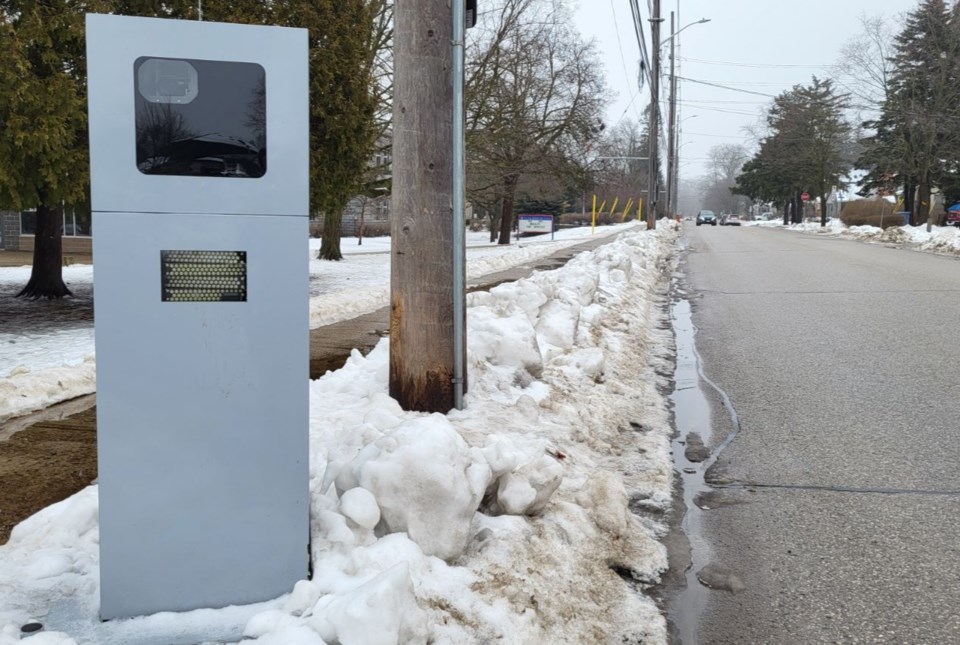Over 14,000 speeding tickets have been issued by the city since the automated speed enforcement program launched in August 2023.
From August 2023 to the end of October 2024, the total revenue of the tickets amounts to $1.6 million, with an average fine of $115 per ticket.
But it seems to be having its intended effect, said Steve Anderson, engineering and transportation services manager for the City of Guelph.
Since the program launched, the average ticket amount is decreasing, suggesting lower speeds, he said.
“So what we’re seeing is, although we still have some people speeding through the speed cameras, the speed at which they’re travelling is less than what we experienced when we launched the program,” he said.
The program was first launched in August 2024 with four automated speed cameras set up in 30 km/h school zones as part of the city’s Vision Zero program, aimed at making the community safer.
The cameras are rotated to new neighbourhoods every three months, and are currently situated on Ptarmigan Drive, Waterloo Avenue, Emma Street and McElderry Road.
When the program kicked off, the city found around 40 per cent of drivers were going at least 10 km/h or more over the speed limit.
“That trend has gone down to about 25 per cent,” he said. “So we are seeing a positive change in driver behaviour, in that speeds are coming down where the cameras have been located.
In May, the city noted an average speed reduction of 20 per cent, or nine km/h.
For example, a post on the city’s website notes the average speeds for the school zone on Ironwood Road near Scottsdale Drive were measured at 43 km/h prior to the program, and dropped “significantly” to 33 km/h once the cameras were there.
The data also found drivers were three times more likely to drive under the posted speed limit in those same locations when an ASE camera was in use compared to before installation.
"The most change was recorded along Stephanie Drive where drivers were six times as likely to drive under the posted speed limit when the ASE was present as compared to the speed compliance prior," the post says.
“It’s trending in the right direction,” Anderson said.
This time last year community members shared concerns around the program, racking up hundreds in tickets before their first had even arrived several weeks later.
“By the time you get your first ticket, you’ve already got eight tickets coming," Coun. Leanne Caron said at the time. “To me, that's unacceptable. You should know right away that you were charged with an offence so that you can respond accordingly."
At the time, those concerns were regularly filling up the inboxes of city staff, though that’s not the case now.
“The number of emails we’ve had on this has dwindled almost to none,” he said.
What hasn’t changed is the time it takes to receive the infraction notice.
However, Anderson said city staff are planning to go to council in March with amendments regarding what the future of the program might look like, including some changes to address mailing delays.
“I can’t really share specifics on it, but we are going to be changing up how we’re rolling out the program,” he said. “That’ll get released in two months.”
Regarding the $1.6 million revenue, the program is considered revenue-neutral, meaning the tickets pay for the enforcement. A small percentage, however, goes back to the city to be placed in a reserve fund dedicated to road safety.
The bulk goes to the vendor, Redflex, as well as the processing centre operated by the City of Toronto, the provincial offences court system in Guelph and the city staff who run the program.
“Just a gentle reminder to drivers, the increase in travel time if you go 30 or 40 in a school zone is very minimal, but the impact on any potential injuries is major,” he said. “Even somebody struck at 40 km/h, those injury impacts can be very severe.”
The next rotation is scheduled for Feb. 1, with cameras going in front of Rickson Ridge Public School, Waverley Drive Public School, St. Michael Catholic School and Ottawa Crescent Public School.


